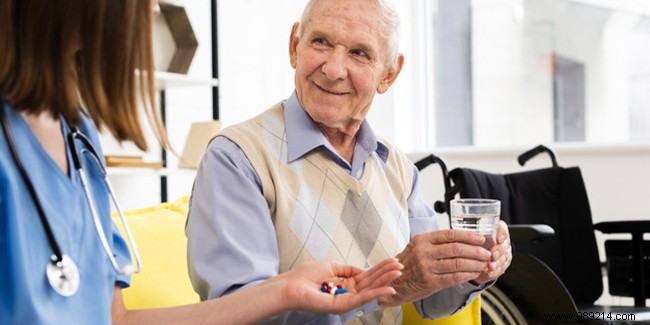
Home care nursing services (SSIAD) are intended for elderly people who are ill, dependent or disabled, who reside in their homes. The SSIADs allow them to benefit from nursing care, but also hygiene, without having to travel and without having to join a care facility for the elderly.
If you are aged 60 or over and you are ill or in a situation of dependence without your condition making your hospitalization or entry into an establishment compulsory, you can apply for home nursing care services (SSIAD ). These services are also available for people with disabilities or who suffer from a chronic illness under the age of 60.
Home nursing services have four main purposes. On the one hand, intervene with an elderly person at home to prevent their loss of autonomy, avoid hospitalization if their state of health allows it. It can also be to facilitate the return home after hospitalization and, for dependent people, to delay entry into an accommodation establishment for the elderly such as an accommodation establishment for dependent elderly people Ehpad for example.
Home nursing care services are medico-social structures whose operation is authorized by the regional health agencies (ARS). They are subject to certain rules, particularly in terms of user rights. Consequently, the SSIADs must respect your user rights such as that of being informed about the care that will be provided, and of opposing it, of accessing your care file, the right to continuity of care, the implementation of a care plan which specifies in an individualized manner what their interventions will be, to be informed by a welcome booklet on the operating conditions of the SSIADs and the services they offer. This welcome booklet must include in appendix the Charter of rights and freedoms of the person received and the rules of operation of the service.
If you have a dispute with SSIADs, you have the possibility of requesting the intervention of a so-called "qualified" person (person appointed by the prefect, the director general of the ARS and the president of the departmental council for his knowledge and experience in the medico-social sector) which plays a mediating role between you and the structure concerned.
SSIAD interventions can take two forms. They concern, on the one hand, assistance care for washing and hygiene in general and, on the other hand, they take the form of nursing acts such as dressings, injections, or even the distribution of medicines, and more generally, medical surveillance carried out in the home of the elderly person who is sick or has lost their autonomy. The SSIADs are provided by nursing assistants and nurses.
Depending on the state of health of the elderly person at home, the SSIADs can be supplemented by the intervention of other health professionals, medical and non-medical workers such as physiotherapists, pedicures, etc. In this case, it is the SSIADs who coordinate the arrival of these professionals at the home of the elderly person.
Home nursing services can also take charge of coordinating the intervention of personal assistance services (housekeeping, assistance with acts of daily living, etc.) in the home of the elderly person.
Home nursing services are provided continuously, 7 days a week, and as needed, even on holidays.
Home nursing care services (SSIAD) are mandatory on medical prescription. These services are fully covered by health insurance. A sick or dependent elderly person who can benefit from it therefore has no costs to advance.
If you have a doctor's prescription to be able to call on SSIADs, you must contact these services which operate near your place of residence. Their contact details are available in the directory made available on the National Information Portal for the elderly and their relatives. You can also find out about them by contacting the local information point present in your department or municipality, whose mission is to inform the elderly and their relatives.
If SSIADs in your sector are available to intervene in your home, a nurse who coordinates the action of these services, called a nurse-coordinator, comes to your home to assess your needs in terms of hygiene and/or medical care. . Depending on the necessary interventions concerning you, it offers you a schedule for passing the SSIADs to your home.